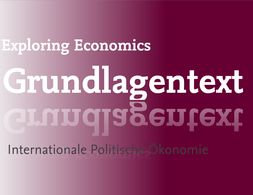65 Ergebnisse
Identity politics is everywhere, polarising discourse from the campaign trail to the classroom and amplifying antagonisms in the media. But the compulsively referenced phrase bears little resemblance to the concept as first introduced by the radical Black feminist Combahee River Collective.
This course teaches basic concepts relevant in political economy. Topics include the contractual nature of the state, public versus private goods, property rights and economic externalities, the logic of collective action and social choice theory. It also refers to the fundamentals of political philosophy, bringing two ideas of liberty into the picture. The relevance and limitations of the economic approach to the study of law and politics are then discussed.
In this radio interview, Philip Mirowski, author of the book "Never Let a Serious Crisis Go to Waste" presents several differences between neoclassical economics and neoliberalism. Apart from a historical outline, Mirowski primarily discusses different perceptions of markets and the role of the state. Mirowski further reflects on the role think tanks ("part of the "neoliberal thought collective") and the entrepreneurial self (the "neoliberal agent") in the spreading and fostering of the neoliberalism.
Three dominant forces worldwide are driving change today in our financial markets: competition, technology and regulation. But their collective impact in reshaping the markets, though they may be viewed individually as desirable or well-intentioned, is producing challenging results that are difficult to predict, hard to control and not easy to understand.
Potts (economics, University of Queensland) proposes evolutionary microeconomics as a synthesis of the collective schools of heterodox economic thought with complex systems theory and graph theory.
What made the false assumption that saving the economy at all cost during a pandemic so popular? This paper discusses different pathways through the COVID-19 pandemic at national and international level, and their consequences on the health of citizens and their economies.
"Why information grows" by Cesar Hidalgo and the atlas of economic complexity. César visits the RSA to present a new view of the relationship between the individual and collective knowledge, linking information theory, economics and biology...
How and by whom are International Labour Standards set? How are they supervised, and how can workers’ organisations use the ILO supervisory mechanisms? What are the key principles of Freedom of Association, the right to strike and Collective Bargaining?
In this essay the authors argue for a wider concept of care work that includes community building, civic engagement and environmental activism. On the basis of the case of Cargonomia, a grassroot initiative in Budapest, they show that such a wider concept of care work could allow for different narratives that promote sustainable lifestyles with a milder environmental and social impact on the planet and its communities.
Dependency in Central and Eastern Europe - Self-reliance and the need to move beyond economic growth
In this essay, the author takes a critical perspective on the pursuit of growth as the solution for providing for environmental sustainability and economic stability in the countries of Central and Eastern Europe.
Drawing from the framework of dependency theory and presenting brief insights into European core-periphery relations the author then argues for the implementation of an alternative strategy to development that is built around the concept of self-reliance.
Stratification economics is defined as a systemic and empirically grounded approach to addressing intergroup inequality. Stratification economics integrates economics, sociology and social psychology to distinctively analyze inequality across groups that are socially differentiated, be it by race, ethnicity, gender, caste, sexuality, religion or any other social differentiation.
The Philosophy of Economics Foundational Text provides a systematic and well-structured overview over the field of philosophy of economics.
The novel coronavirus (Covid-19) is rapidly spreading around the world. The real economy is simultaneously hit by a supply shock and a demand shock by the spread of coronavirus. Such a twin shock is a rare phenomenon in recent economic history.
On July 2020 ZOE-Institute published a unique platform for transformative policymaking: Sustainable Prosperity. Building on insights from new economic thinking the platform provides knowledge about ideas, arguments and procedures that support effective promotion of political change. It aims to strengthen change makers in public policy institutions, who are working on an ambitious green and just transition. As such, it provides convincing arguments and policy ideas to overcome the reliance of economic policy on GDP growth
The outbreak of COVID-19 has substantially accelerated the digitalization of the economy. Yet, this unprecedented growth of digital technology brought novel challenges to the labour market. Rise in income inequalities and precarious working conditions or polarization of jobs. In this essay, we try to assess what tools to use to counter these trends.
Die Covid-19-Pandemie hat gezeigt, dass manche wirtschaftliche Zonen wichtiger sind als andere, um Lebensgrundlagen zu sichern und ein gutes Leben zu ermöglichen. An dieser „Alltagsökonomie“ gilt es anzusetzen, um Wirtschaften zukunftsfähig zu machen. Ein Beitrag von Richard Bärnthaler, Andreas Novy, Leonhard Plank und Alexandra Strickner.
A review of:
[1] Intermediate Microeconomics, H.R. Varian
[2] Mikrooekonomie, R.S. Pindyck, D.L. Rubinfeld
[3] Grundzuege der mikrooekonomischen Theorie, J. Schumann, U. Meyer, W. Stroebele
In diesem Text aus der Reihe "Exploring Economics - Foundations" werden die Grundlagen der Internationalen Politischen Ökonomie als interdisziplinäre wissenschaftliche Strömung dargestellt.
This course provides future change makers in public and private sectors with a comprehensive overview on the structures and actors that shape markets.
Obwohl viele technische Lösungen für gesellschaftliche Herausforderungen wie den Klimawandel auf der Hand liegen, sind wir als globale Gesellschaft häufig nicht in der Lage, diese umzusetzen. Warum führt die kollektive Erfahrung eines kollabierenden Systems nicht zur kollektiven Handlung? Ein Beitrag von Katrin Käufer und Claus Otto Scharmer.
The premise of this workshop is that we, as knowledge producers - especially within westernized universities (Grosfoguel, 2013), are significantly implicated in neoliberal imaginaries that are often in service of hierarchical, binary, competitive and linear narratives of growth as civilizational progress.
This course will fundamentally ask whether we can, or even should use the word ‘decolonising’ in our pursuit of a better economics?
Post-Keynesians focus on the analysis of capitalist economies, perceived as highly productive, but unstable and conflictive systems. Economic activity is determined by effective demand, which is typically insufficient to generate full employment and full utilisation of capacity.
In 18th century Europe figures such as Adam Smith, David Ricardo, Friedrich List and Jean Baptiste Colbert developed theories regarding international trade, which either embraced free trade seeing it as a positive sum game or recommended more cautious and strategic approaches to trade seeing it as a potential danger and a rivalry and often as a zero-sum game. What about today?
Unser Ziel ist es, drei Lehrbücher auf den in ihnen verwendeten Ordnungsbegriff zu untersuchen.
How can we establish new institutions and practices in order to use fare-free public transport as a beacon for sustainable mobility and a low-carbon lifestyle? The author of this essay elaborates on how practice theory and institutional economics can help to answer this question.
In this essay the author elaborates on the EU's perspective on the fast growing sector of the platform economy.
An essay of the writing workshop on contemporary issues in the field of Nigerian economics: Labour and all the dynamics, such as laws, mobility, gender participation, regulation etc., that are associated with it cements the need for this paper which seeks to objectively review, analyse, and if deemed necessary, give plausible recommendations.
The core of Georgism is a policy known as the Land Value Tax (LVT), a policy which Georgists claim will solve many of society and the economy’s ills. Georgism is an interesting school of thought because it has the twin properties that (1) despite a cult following, few people in either mainstream or (non-Georgist) heterodox economics pay it much heed; (2) despite not paying it much heed, both mainstream and heterodox economists largely tend to agree with Georgists. I will focus on the potential benefits Georgists argue an LVT will bring and see if they are borne out empirically. But I will begin by giving a nod to the compelling theoretical and ethical dimensions of George’s analysis, which are impossible to ignore.
Markets are the focus in modern economics: when they work, when they don’t and what we can or can’t do about it. There are many ways to study markets and how we do so will inevitably affect our conclusions about them, including policy recommendations which can influence governments and other major organisations. Pluralism can be a vital corrective to enacting real policies based on only one perspective and a plethora of approaches provide alternatives to the canonical view. Although they have differing implications, these approaches share the idea that we should take a historical approach, analysing markets on a case-by-case basis; and they share a faith in the power of both individuals and collectives to overcome the problems encountered when organising economic activity.
How countries achieve long-term GDP growth is up there with the most important topics in economics. As Nobel Laureate Robert Lucas put it “the consequences for human welfare involved in questions like these are simply staggering: once one starts to think about them, it is hard to think about anything else.” Ricardo Hausmann et al take a refreshing approach to this question in their Atlas of Economic Complexity. They argue a country’s growth depends on the complexity of its economy: it must have a diverse economy which produces a wide variety of products, including ones that cannot be produced much elsewhere. The Atlas goes into detail on exactly what complexity means, how it fits the data, and what this implies for development. Below I will offer a summary of their arguments, including some cool data visualisations.
Dr. Katherine Trebeck explains some reasons why we should believe the future of the economy should be a wellbeing economy.
Wir nutzen Cookies. Klicke auf "Akzeptieren" um uns dabei zu helfen, Exploring Economics immer besser zu machen!





























